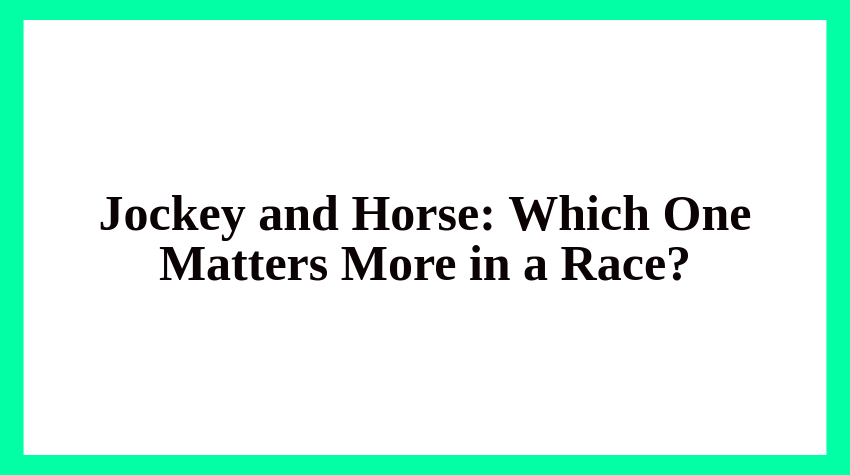What Matters in a Horse Race?
When watching a thrilling horse race, many fans ask the same question: Is victory determined more by the horse’s ability or the jockey’s skill? The answer isn’t simple, because both play crucial roles. The horse provides the speed, stamina, and natural athleticism, while the jockey applies strategy, control, and experience to harness that potential.
In this guide, we’ll explore the relationship between jockey and horse, examining how each influences race outcomes. We’ll also break down practical examples and insights for bettors who want to make smarter predictions when wagering on horse racing.
The Role of the Horse
🐎 Physical Attributes
The horse is the true powerhouse of any race, and its natural attributes often determine whether it has the raw potential to compete at a high level. Key factors include:
Speed and Stamina
Not all horses are built for the same type of race. Some have explosive bursts of speed that make them ideal for short-distance sprints (like 1,000–1,200 meters), while others thrive in endurance-heavy races that stretch beyond a mile. A horse’s stride length, lung capacity, and cardiovascular efficiency all influence whether it can maintain pace or accelerate late in a race. Bettors and trainers often analyze past performance to determine a horse’s preferred racing distance.
Genetics and Breeding
Pedigree is often one of the first things professionals look at when evaluating a horse. Horses from bloodlines known for champion sprinters or marathon racers carry genetic advantages in stride efficiency, muscle composition, and temperament. For instance, descendants of certain stallions are recognized for producing offspring with exceptional closing speed or consistency under pressure. Breeding doesn’t guarantee success, but it heavily influences potential.
Age and Health
- Younger Horses (2–3 years old): Typically showcase explosive speed and agility, but may lack consistency and experience.
- Prime-Aged Horses (4–6 years old): Often combine speed with developed stamina and maturity, making them top competitors.
- Older Horses (7+ years old): While they may lose a step in raw speed, their racing wisdom, calm temperament, and muscle memory allow them to perform admirably under the right conditions.
Health also plays a massive role. A horse recovering from an injury or struggling with minor ailments might underperform even if its pedigree is world-class. Regular veterinary care, joint treatments, and proper hoof maintenance are essential for peak health.
🐎 Training and Conditioning
Even a perfectly bred horse cannot succeed without structured and consistent training. The preparation behind the scenes often determines how well natural talent translates into real-world performance.
Exercise Routines
Trainers use tailored workouts to build strength, endurance, and explosiveness. These can include:
- Gallops to maintain stamina.
- Sprint intervals to sharpen acceleration.
- Gate training to improve start reaction times.
Each workout is carefully timed and adjusted based on the horse’s age, health, and upcoming races.
Diet and Nutrition
Just like human athletes, horses rely on carefully balanced diets:
- High-quality hay and grains for energy.
- Supplements and minerals for bone strength and muscle recovery.
- Electrolytes to prevent dehydration, especially after intense workouts.
A proper diet doesn’t just fuel performance—it also ensures recovery and long-term durability.
Rest and Recovery
Overtraining can be just as harmful as undertraining. Horses require downtime to allow their muscles and cardiovascular systems to rebuild stronger. Trainers balance hard training days with light exercise or rest, ensuring horses don’t risk fatigue or injury. Recovery strategies may include massage, hydrotherapy, and turnout time in open paddocks to relax.
The Role of the Jockey
👨✈️ Tactical Decision-Making
Jockeys are far more than passengers—they are the strategic masterminds guiding the horse through every step of the race. Their split-second decisions often mean the difference between victory and defeat.
Pacing Control
One of the jockey’s most critical responsibilities is deciding how fast the horse should run at different stages of the race.
- Push too early: The horse risks burning out before the finish line.
- Hold back too long: They may leave too much ground to cover in the final stretch.
The ability to distribute the horse’s stamina evenly is what allows champions to finish strong.
Positioning in the Pack
Jockeys must constantly analyze where they stand relative to competitors. Hugging the rail can shorten the distance, but risks getting boxed in. Swinging wide might cost extra meters, but it offers space to accelerate. Every movement—slipping between horses, blocking rivals, or tucking behind a leader to conserve energy—requires sharp awareness and flawless timing.
Adaptability Mid-Race
No race goes exactly as planned. Track conditions, rival strategies, or even a horse’s mood can change unexpectedly. Skilled jockeys can adjust tactics on the fly—shifting from a conservative hold to an aggressive push, or changing lanes to find a better opening. This flexibility is what makes experienced riders stand out in high-stakes competitions.
👨✈️ Communication with the Horse
Riding is not just about steering; it’s about forming a silent partnership with the horse. The best jockeys know how to “talk” to their mounts without words.
Balance and Posture
A jockey’s body is like a counterweight. By staying light and perfectly aligned with the horse’s stride, they reduce drag and energy loss. Leaning too far forward or shifting unevenly can actually slow a horse down, so posture is critical.
Cue Systems
Jockeys use a combination of subtle rein movements, leg pressure, and body signals to communicate. These cues tell the horse when to accelerate, when to hold back, or when to change lanes. A good jockey gives instructions without breaking the horse’s rhythm—keeping the flow smooth and uninterrupted.
Building Trust
Horses are highly intuitive animals. They perform better when they trust their rider. A confident, calm jockey helps a nervous horse settle into the race. Over time, repeated training and racing together strengthen this bond, allowing the horse to respond instantly to even the smallest signal.
Jockey vs. Horse: Which One Matters More?
🏇 Historical Examples
- Secretariat (1973 Triple Crown winner): A horse so dominant that even with an average jockey, it likely would have won.
- Seabiscuit: Known for raw determination, but his success skyrocketed under jockey Red Pollard, whose riding style complemented his temperament.
📊 Balance of Influence
- In elite races, horses provide 70% of the performance edge, while jockeys contribute 30% through tactics and skill.
- However, when horses are evenly matched, the jockey’s decisions can become the deciding factor.
Betting Insights: Jockey and Horse in Wagering
📌 Evaluating the Horse First
When placing bets, focus on:
- Past performance records.
- Race distance compatibility.
- Recent health and training updates.
📌 Considering the Jockey’s Record
- Jockey win percentages.
- Experience on specific tracks.
- Past partnerships with the same horse.
Example: A skilled jockey with a proven history on turf tracks can make a huge difference, even if the horse isn’t the fastest on paper.
💡 If you’re new to horse racing, check out our beginner’s guide here: What is Horse Racing?
Other Factors That Influence Races
🌦️ Track Conditions
- Wet or muddy tracks favor horses with strong endurance and jockeys with careful pacing strategies.
🏟️ Race Distance
- Short sprints highlight a horse’s raw speed.
- Longer races test stamina and a jockey’s pacing judgment.
🧠 Psychological Elements
- Nervous horses may falter in crowded races.
- Calm jockeys keep both themselves and the horse composed under pressure.
Conclusion: Jockey and Horse Together Create Victory

\ Place Your Bets and Gallop Towards Victory! /
So, which matters more—the jockey or the horse? The truth is, neither can succeed without the other. A powerful horse without guidance may waste its energy, while a talented jockey cannot win with a horse lacking speed or stamina.
For bettors, the best approach is to consider both sides of the equation:
- Study the horse’s performance history and condition.
- Review the jockey’s past record and track experience.
- Pay attention to external conditions like track type and weather.
Ultimately, the magic of racing comes from the partnership between jockey and horse. Each race is a story of teamwork, strategy, and athletic brilliance.
If you’re eager to dive deeper into horse racing strategies, Casino Savvy is your trusted source for guides, tips, and betting insights. Visit us here: https://free-gamblings.com/









Comments